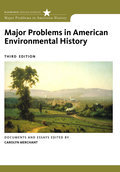
MAJOR PROBLEMS IN AMERICAN ENVIRONMENTAL HISTORY presents major themes and controversial issues from native American times to the present, drawn from compelling, readable sources that draw readers into the process of developing theirown perspectives on American environmental history. INDICE: Note: Each chapter concludes with Further Reading. 1. WHAT IS ENVIRONMENTAL HISTORY? Essays. Donald Worster, Doing Environmental History. Jared Diamond, Predicting Environmental History. William Cronon, Using EnvironmentalHistory . Carolyn Merchant, Interpreting Environmental History. J. Donald Hughes, Global Environmental History. 2. NATIVE AMERICAN ECOLOGY AND EUROPEAN CONTACT. Documents. 1. A Spanish Explorer Views the Pueblos, 1580. 2. Spanish Explorers Observe Pueblo Irrigation, 1582. 3. A Spaniard Testifies on the Effectsof Pueblo Colonization, 1601. 4. Nicholas Denys on the Micmac Fur Trade, 1672. 5. A Jesuit Missionary Recalls Micmac Hunting Rituals, 1691. 6. Lewis and Clark Describe the Great Plains, 1804. 7. Plains Indians' Pictographs, Recorded by George Catlin in 1844. Essays. Ramón Gutiérrez, Pueblos and Spanish in the Southwest. Calvin Martin, Micmacs and French in the Northeast. Andrew Isenberg, Indians and Bison on the Great Plains. 3. THE NEW ENGLAND FOREST IN THE SEVENTEENTH CENTURY. Documents. 1. William Bradford Faces a "Hideous and Desolate Wilderness," 1620-35. 2. John Winthrop Quotes Genesis on Subduing the Earth, 1629. 3. Thomas Morton Praises the New English Canaan, 1632. 4. William Wood onIndian Women's Housing and Horticulture, 1634. 5. Anne Bradstreet Eulogizes Nature, 1650. 6. Edward Johnson on Transforming the Wilderness, 1654. 7. A Timber Merchant's Estate, 1682. 8. Cotton Mather on the Scale of Nature, 1721. 9. A Governor Enforces the King's Forest Policy, 1730. Essays. Jim O'Brien, A Beaver's Perspective. Samuel. F. Manning, A Colonist's Perspective. Mark Stoll, Puritan Perspectives. 4. TOBACCO AND RICE IN THE COLONIAL SOUTH. Documents. 1. John White Depicts Indian Planting and Fishing in North Carolina, 1590. 2. Virginia Settlers Discover Tobacco, 1614-1617. 3. A Chesapeake Planter Describes His Holdings, 1686. 4. Robert Beverley on Indians and Nature in Virginia, 1705. 5. A Governor Explains South Carolina Rice Production, 1761. 6. A Traveler Describes Tobacco Cultivation, 1775. 7. Thomas Jefferson on the "Nature" of Blacks and Worn-Out Soils, 1787. 8. Olaudah Equiano Describes His Enslavement, 1791. Essays. Avery Craven, Tobacco and Soils in the Chesapeake. Judith Carney, Rice and Slaves in the Low Country. William Katz, Black Indians in the South. 5. FARMS AND CITIES IN THE EARLY REPUBLIC. Documents. 1. J. Hector St. John deCrèvecoeur Asks, "What Is an American?" 1782. 2. Thomas Jefferson on the Agrarian Ideal, 1787. 3. Benjamin Rush Praises the Market Farmers of Pennsylvania,1789. 4. Anna Howell's Farm Diary, 1820. 5. Samuel Slater's Proposal on Cotton Spinning, 1789. 6. Benjamin Henry Latrobe on Polluted Water in Philadelphia,1798. 7. John James Audubon Depicts the Squatters of the Mississippi, 1808-1834. 8. Calvin Colton on Self-made Men, 1844. Essays. Carolyn Merchant, Farms and Subsistence. Martin Melosi, Pollution and Cities. Theodore Steinberg, Waterand Industry. 6. NATURE AND THE MARKET IN THE NINETEENTH CENTURY. Documents. 1. Phillis Wheatley Eulogizes Nature, 1773. 2. John James Audubon on Shooting Birds, 1808-1834. 3. James Fenimore Cooper Laments the "Wasty Ways" of Pioneers, 1823. 4. Hudson River Painters Depict Nature, 1836-1849. 5. George Catlin on Indians, Nature, and Civilization, 1844. 6. Ralph Waldo Emerson Expounds on Nature and Wealth, 1844. 7. Henry David Thoreau on Nature Versus Civilization,1854. 8. Rebecca Harding Davis on Pollution and Human Life in the Iron Mills,1861. Essays. Michael Heiman, Civilization Over Nature. Robert Kuhn McGregor,Nature Over Civilization. Elizabeth Blum, Slave Women and Nature. 7. THE COTTON SOUTH BEFORE AND AFTER THE CIVIL WAR. Documents. 1. Frances Anne Kemble on Slavery and Nature in Georgia, 1838. 2. A Georgia Planter Tells Why Cotton Pays, 1847. 3. Frederick Law Olmsted Describes Cotton Production and Environmental Deterioration, 1861. 4. Sharecroppers' Contracts, 1876-1886. 5. Freed Slave Louis Hughes on Cotton and Cotton Worms, 1897. 6. A Louisiana Convention Declares War on the Boll Weevil, 1903. 7. Ex-Slaves Describe Their Means of Subsistence, 1937. 8. A Freed Slave Explains "Why That Boll Weevil Done Come," 1945. Essays. Albert Cowdrey, Soils Used. Eugene Genovese, Soils Abused. Theodore Steinberg, Soils Extracted. 8. EXTRACTING THE FAR WEST IN THE NINETEENTH CENTURY. Documents. 1. A Russian Sailor on the Sea Otter Trade, 1813. 2. A Manager Describes the Russian American Company, 1835. 3. Thomas Hart Benton on Manifest Destiny, 1846. 4. An Federal Agent Assesses Mining's Impact on the Indians, 1853. 5. James Marshall Tells How He Discovered Gold, 1857. 6. Joaquin Miller Describes Environmental Deterioration in the Gold Country, 1890. 7. A Fish Commissioner on the Need for Salmon Protection, 1885. 8. A Capitalist Advocates Salmon Hatcheries, 1893. 9. An Indian Woman Deplores the Soreness of the Earth, Recorded in 1925. Essays. James Gibson, Otters versus Russians in Alaska. Robert Kelley, Miners versus Farmers in California. Richard White, Salmon versus Fishers in the Northwest 9. GREAT PLAINS GRASSLANDS EXPLOITED. Documents. 1. Pioneer Women Portray the Plains Environment, 1860-86. 2. The Homestead Act, 1862. 3. Joseph G. McCoy on the Chisholm Trail and Abilene Stockyards, 1874. 4. Frederick Jackson Turner on the Significance of the Frontier in American History, 1893. 5. John Steinbeck Depicts the Dust Bowl, 1939. 6. Plenty-Coups Mourns the Vanishing Buffalo, Recorded in 1950. 7. An Editor Bids Good Riddance to Buffalo, 1979. Essays. Walter Prescott Webb, Great Plains Ecology. Donald Worster, Cowboy Ecology. William Cronon, Telling Stories About Ecology. 10. RESOURCECONSERVATION IN AN INDUSTRIALIZING SOCIETY. Documents. 1. George Perkins Marsh on Man and Nature, 1864. 2. John Wesley Powell Advocates Reclamation, 1878. 3. The Rec
- ISBN: 978-0-495-91242-2
- Editorial: Wadsworth
- Encuadernacion: Rústica
- Páginas: 576
- Fecha Publicación: 22/08/2011
- Nº Volúmenes: 1
- Idioma: Inglés
